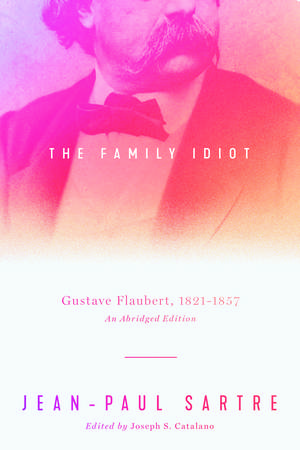The Family Idiot: Gustave Flaubert, 1821–1857, An Abridged Edition
Autor Jean-Paul Sartre Editat de Joseph S. Catalano Traducere de Carol Cosmanen Limba Engleză Paperback – 19 ian 2023
| Toate formatele și edițiile | Preț | Express |
|---|---|---|
| Paperback (1) | 162.81 lei 3-5 săpt. | +16.56 lei 6-10 zile |
| University of Chicago Press – 19 ian 2023 | 162.81 lei 3-5 săpt. | +16.56 lei 6-10 zile |
| Hardback (1) | 564.47 lei 3-5 săpt. | +22.98 lei 6-10 zile |
| University of Chicago Press – 19 ian 2023 | 564.47 lei 3-5 săpt. | +22.98 lei 6-10 zile |
Preț: 162.81 lei
Nou
Puncte Express: 244
Preț estimativ în valută:
31.16€ • 33.83$ • 26.17£
31.16€ • 33.83$ • 26.17£
Carte disponibilă
Livrare economică 02-16 aprilie
Livrare express 18-22 martie pentru 26.55 lei
Preluare comenzi: 021 569.72.76
Specificații
ISBN-13: 9780226822327
ISBN-10: 022682232X
Pagini: 304
Dimensiuni: 152 x 229 x 20 mm
Greutate: 0.43 kg
Ediția:Prescurtată
Editura: University of Chicago Press
Colecția University of Chicago Press
ISBN-10: 022682232X
Pagini: 304
Dimensiuni: 152 x 229 x 20 mm
Greutate: 0.43 kg
Ediția:Prescurtată
Editura: University of Chicago Press
Colecția University of Chicago Press
Notă biografică
Jean-Paul Sartre (1905-1980) was a French philosopher and leading figure of the existentialist movement. He was awarded the Nobel Prize for Literature in 1964. Joseph S. Catalano is professor emeritus of philosophy at Kean University. He is the author Reading Sartre and The Saint and the Atheist. Carol Cosman was a translator of French literature and letters, including works by Camus, Balzac, Beauvoir, and Durkheim.
Cuprins
Editor’s Introduction
Chapter One: Problem: A Family Idiot Who Became a Genius
Chapter Two: Quidquid volueris
Chapter Three: Gustave at Fifteen
Chapter Four: A Rediscovered Childhood
Chapter Five: To Act or To Write
Chapter Six: Being Seen
Chapter Seven: Ambivalent
Chapter Eight: Birth of the Garçon
Chapter Nine: A Review
Chapter Ten: The Last Spiral: The Event
Chapter Eleven: Hysterical Commitment: Neurosis as Response
Chapter Twelve: Approaching Conversion
Chapter Thirteen: Conversion
Chapter Fourteen: The (Second) Problem
Chapter Fifteen: (The Problem Concluded): The Objective Spirit
Chapter Sixteen: Neurosis: Personal and Objective
Chapter Seventeen: Objective Neurosis and Madame Bovary
Editor’s Conclusion
Acknowledgments
Notes
Index
Chapter One: Problem: A Family Idiot Who Became a Genius
Chapter Two: Quidquid volueris
Chapter Three: Gustave at Fifteen
Chapter Four: A Rediscovered Childhood
Chapter Five: To Act or To Write
Chapter Six: Being Seen
Chapter Seven: Ambivalent
Chapter Eight: Birth of the Garçon
Chapter Nine: A Review
Chapter Ten: The Last Spiral: The Event
Chapter Eleven: Hysterical Commitment: Neurosis as Response
Chapter Twelve: Approaching Conversion
Chapter Thirteen: Conversion
Chapter Fourteen: The (Second) Problem
Chapter Fifteen: (The Problem Concluded): The Objective Spirit
Chapter Sixteen: Neurosis: Personal and Objective
Chapter Seventeen: Objective Neurosis and Madame Bovary
Editor’s Conclusion
Acknowledgments
Notes
Index
Recenzii
“The nihilism of the imaginary, as it is elaborately anatomized in The Family Idiot, is [not] a mere nineteenth-century curiosity or a local feature of some specifically French middle-class culture; nor is it a private obsession of Jean-Paul Sartre himself. Turning things into images, abolishing the real world, grasping the world as little more than a text or sign-system—this is notoriously the very logic of our own consumer society, the society of the image or the media event . . . [The Family Idiot] may well speak with terrifying immediacy [today].”
“A virtuoso performance. . . . For all that this book does to make one reconsider his life, The Family Idiot is less a case study of Flaubert than it is a final installment of Sartre’s mythology.”
“The Family Idiot, Sartre’s last magnum opus, a penetrating and challenging analysis of Gustave Flaubert, has remained less well known than his earlier works, in large measure because of the inordinate length of the original version. Catalano’s superb, masterful abridgment, together with his introduction and occasional explanatory notes, is destined to stimulate important new scholarly explorations by philosophers, psychologists, students of literature, and so many others.”
"A well-paced and quite comfortably readable work."
